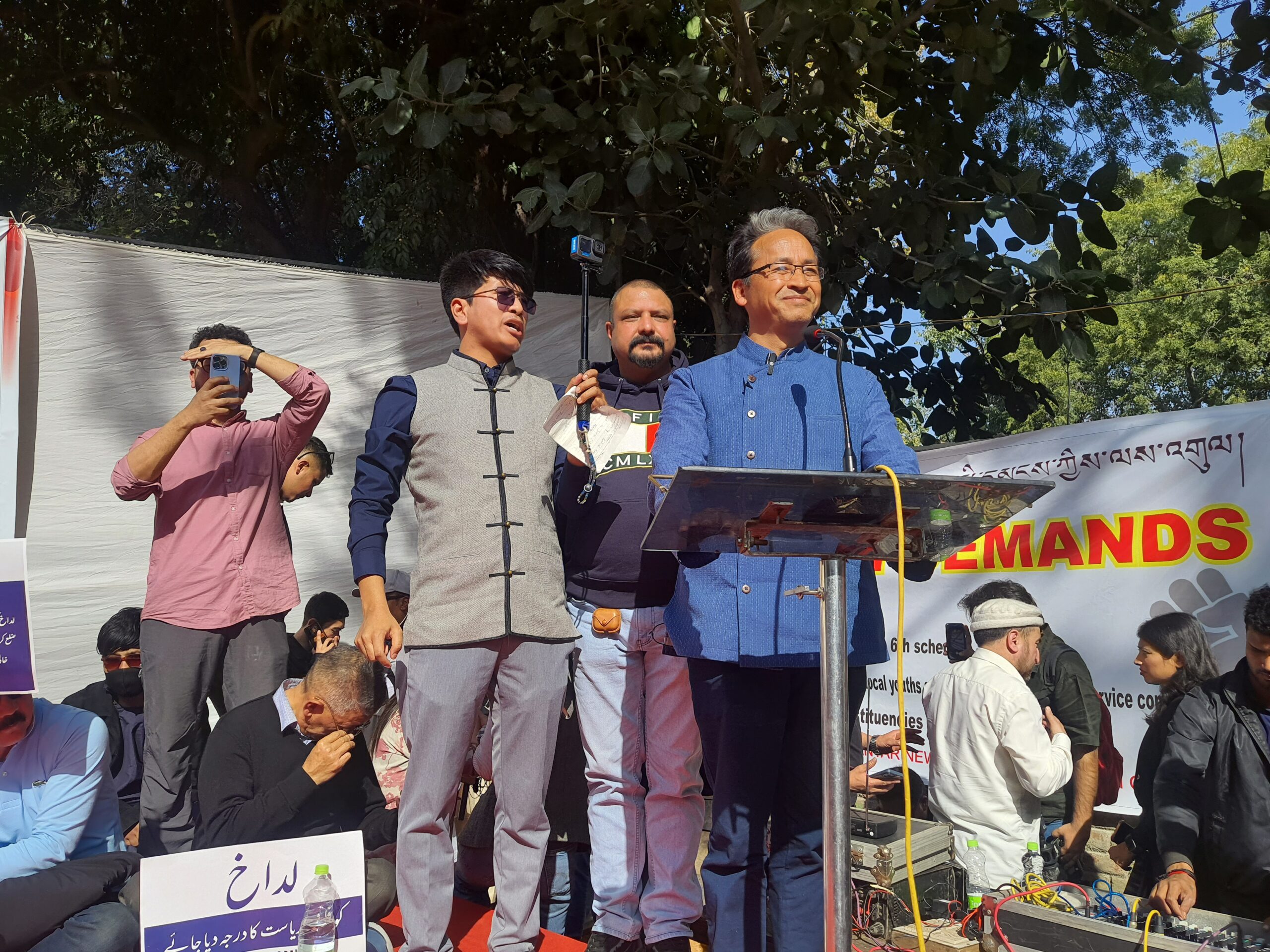Ladakh residents seek statehood & Constitutional safeguards

Hundreds of people from Ladakh along with environmental activist Sonam Wangchuk staged a protest in New Delhi (Photo: MIG/Mohsina Malik)
Accusing the government of turning a deaf ear to their long-standing demands, following the division of Jammu and Kashmir state into two union territories, hundreds of people along with environmental activist and educationist, Sonam Wangchuk, staged a daylong protest at Jantar Mantar, New Delhi.
The protestors were demanding statehood and the sixth schedule under the Indian Constitution, and raised their other demands including job reservations, a separate public service commission for Ladakh and two parliamentary seats for the territory, namely one each Leh and Kargil. While protesting, people were carrying placards saying, “Ladakh Demands Statehood, We demand 6th schedule for protection of land, Save Ladakh, Restore Democracy in Ladakh” and raised slogans.
The protest was organised by two political groups, Leh Apex Body and Kargil Democratic Alliance, which is an amalgam of trade unions, and social, political, and religious groups from Ladakh. Protestors say that the government has neglected them and none of their demands has been fulfilled as the government had promised. They also claimed that after the abrogation of Article 370 of the Indian Constitution in 2019, nothing has changed in Ladakh and their issues have worsened more, and no development has taken place until now.
“When Ladakh was turned into a Union Territory after abrogating Article 370, we were promised by the government that development will happen. However, it has been more than three years since then and the people of Ladakh have not seen any development or changes happening,” Noor Mohammad, an elderly man from Ladakh tells Media India Group.
“Several times we have put forth our demands and continuously raised our voices against the injustice we are going through but no one from the government is ready to listen to our woes and that is the reason we came to Delhi to protest and let our voices reach deaf ears of the government,” Mohammad adds.
The protestors say that their demand for statehood for Ladakh and its inclusion in the Sixth Schedule of the Constitution in order to secure their future and rights and protection to the fragile environment of Ladakh. The Sixth Schedule empowers autonomous councils to govern rights over land, forest, sanitation, and employment, with the interest of safeguarding cultural and indigenous identities.
“Over 95 pc of people are tribal here which means that the Sixth Schedule is applicable in the region. We have been demanding its implementation for a long now. We want to safeguard our land, resources, water, and glaciers in the region and want our basic rights and our voices to be heard,” Sajjad Kargili, a political activist tells Media India Group.
In January, the Home Ministry of India constituted a high-powered committee headed by Minister of State Nityanand Rai to ensure the protection of land and employment for the people of Ladakh. But the protestors claim that nothing has really happened on the ground.
“The government is saying that they will provide the youth with jobs and the best opportunities so that we can excel and develop various sectors in Ladakh. How it is possible when the government is yet to take a step and everything is on paper? We want job reservations so that our future is secured and we do not have to run from pillar to post in search of employment. In Ladakh, various sectors including education and hospitals lack basic facilities, which is very concerning and alarming, when these sectors should not be neglected,” Nazir Ahmad, a 25-year-old commerce student at Kashmir University tells Media India Group.
Another major concern of the protestors relates to the degradation of environment and the impact of climate change on Ladakh, especially the melting of glaciers and the resultant lack of water availability. Last month, environment activist Sonam Wangchuk had staged a five-day hunger strike in freezing sub-zero temperatures highlighting Ladakh’s climate crisis and the effects of excessive mining, infra projects, and other elements concerning the fragile ecological system of the region and said he will be fasting at intervals if the demands are not fulfilled.
“Ladakh has a huge shortage of water as glaciers have started melting at an alarming rate and if investors will come then our resources and environments will have to pay the cost and people will suffer in the coming future. The region is among the vulnerable parts of the country to the impacts of climate change, as glaciers are retreating and whole villages are forced to relocate in search of water that is the reason we have to safeguard our fragile ecosystem as soon as possible,” Wangchuk tells Media India Group.
“We are demanding the sixth schedule so that our land, resources, and glaciers remain safe and we can ourselves govern and decide what is needed and beneficial for our region,” he adds.
Wangchuk and other protestors say that the large-scale projects of mining and building roads and other constructions are seriously impacting the fragile ecosystem here and call for a ban on projects without proper environmental impact studies.









